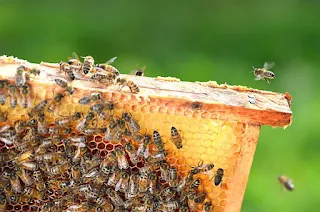Apiculture: The Essential Practice of Beekeeping for Ecosystem and Agricultural Health
Apiculture: The Essential Practice of Beekeeping for Ecosystem and Agricultural Health
Introduction
Key Components of Apiculture
1. Bee Species: The most commonly kept species for apiculture is the Western honeybee (Apis mellifera), though other species like Apis cerana and Apis dorsata are also used in different regions.
2. Beehives: These are the structures where bee colonies live. Traditional hives have given way to more modern designs like the Langstroth hive, which allows for better management and honey extraction without destroying the hive.
3. Tools and Equipment: Beekeepers use various tools such as smokers (to calm bees), hive tools (for prying apart hive components), protective clothing (to prevent stings), and extractors (to harvest honey).
4. Bee Products: The primary products harvested from beekeeping include honey, beeswax, propolis, royal jelly, and bee venom. Each of these has its uses in food, medicine, and industry.
5. Management Practices: Effective beekeeping requires knowledge of bee behavior, seasonal management, disease control, and breeding. This includes regular inspections, feeding during scarce periods, and managing pests like Varroa mites.
Importance of Bees in the Ecosystem
Bees play a critical role in the ecosystem primarily through their role in pollination. This process is vital for the reproduction of many plants, including a significant portion of human food crops.
1. Pollination: Bees are among the most efficient pollinators. They transfer pollen from the male parts of a flower to the female parts, facilitating the fertilization necessary for fruit and seed production. It’s estimated that one-third of the food we consume relies on pollination by bees.
2. Biodiversity: Bees help maintain biodiversity by enabling the reproduction of a wide variety of plants. This supports other wildlife that depends on these plants for food and habitat.
3. Ecosystem Services: Beyond pollination, bees contribute to ecosystem health in other ways, such as supporting the growth of trees and other plants that provide oxygen and sequester carbon dioxide, thus mitigating climate change.
Challenges Facing Bees and Apiculture
1. Pesticides: Exposure to pesticides, particularly neonicotinoids, has been linked to bee population declines. These chemicals can be toxic to bees, affecting their navigation, reproduction, and overall health.
2. Habitat Loss: Urbanization, deforestation, and agricultural expansion have reduced the natural habitats available for bees. This limits their food sources and nesting sites.
3. Climate Change: Changes in climate patterns can affect the availability of flowers and alter the synchrony between bees and their food sources. Extreme weather events can also directly harm bee populations.
4. Disease and Parasites: Bees face numerous threats from diseases and parasites like the Varroa destructor mite, Nosema fungus, and various viruses. These can weaken or decimate bee colonies.
Conservation and Sustainable Practices
To support bee populations and the practice of apiculture, several strategies can be implemented:
1. Integrated Pest Management (IPM): Using IPM can help reduce the reliance on harmful pesticides by employing biological control methods and other less toxic alternatives.
2. Habitat Restoration: Planting bee-friendly plants and creating habitats like wildflower meadows can provide bees with essential forage and nesting sites.
3. Education and Awareness: Promoting the importance of bees and educating the public and farmers about sustainable practices can help foster environments where bees can thrive.
4. Research and Development: Investing in research to understand bee diseases, genetics, and behavior can lead to better management practices and solutions to current challenges.
Conclusion
In conclusion, apiculture is a vital practice for human agriculture and the health of global ecosystems. Bees, through their pollination activities, are indispensable for food production and biodiversity. Protecting and supporting bee populations through sustainable practices and conservation efforts is crucial for maintaining the balance of our planet's ecosystems.
We greatly appreciate your continuous support and engagement with our website. Your feedback is invaluable to us, so please don't hesitate to share your thoughts in the comment section below. Your comments inspire us to keep delivering high-quality articles that cater to your interests and needs. Thank you for being a part of our community, and we look forward to providing you with more insightful content in the future.
Join my Teligram channel - Click here
Join my whatsapp channel- Click here















Post a Comment